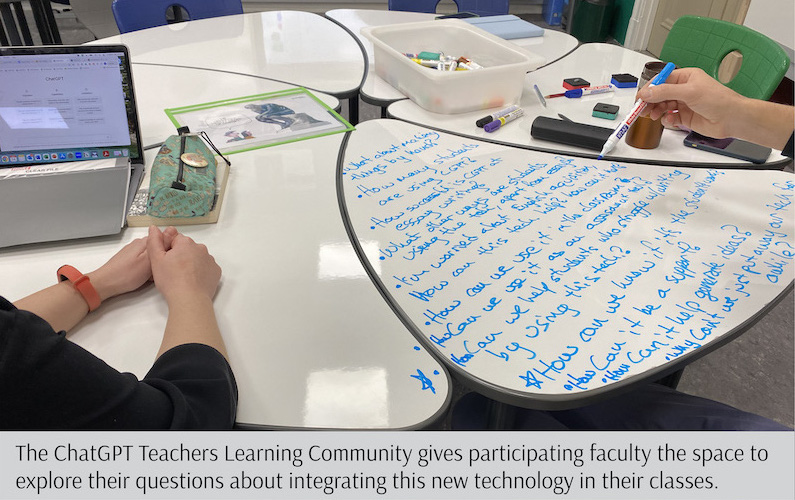RC students learn to navigate the world of ChatGPT.
RC NEWS
 Artificial Intelligence (AI) is shaping up to be an important force in education. RC teachers Allison Finn, Head of Educational Research, and Pınar Kadıoğlu, Educational Technology Coordinator, are leading faculty with the use of AI in the classroom. With ChatGPT currently dominating the cultural conversation about AI, Finn and Kadıoğlu have created a ChatGPT TLC (Teacher Learning Community). Faculty had questions around two key areas: effective use of AI and potential misuse of AI. As a next step, they delineated how AI is already being used at RC. Here are some examples:
Artificial Intelligence (AI) is shaping up to be an important force in education. RC teachers Allison Finn, Head of Educational Research, and Pınar Kadıoğlu, Educational Technology Coordinator, are leading faculty with the use of AI in the classroom. With ChatGPT currently dominating the cultural conversation about AI, Finn and Kadıoğlu have created a ChatGPT TLC (Teacher Learning Community). Faculty had questions around two key areas: effective use of AI and potential misuse of AI. As a next step, they delineated how AI is already being used at RC. Here are some examples:
In the English Department, a team of teachers asked students to experiment with prompts and different voices in ChatGPT to generate different versions of their essays. This assignment started as a way to pre-empt plagiarism and turned into an opportunity for students to apply creative problem solving in the creation of their prompts.
Esin Pulathaneli, history teacher and head of RC’s Social Sciences Department, reports they used AI in the classroom as a way of reinforcing the subject matter: “First, we discussed issues requiring synthesis and analysis and touched on cause-effect relationships. We then asked AI similar topics and discussed the answers. Improving and rewriting incorrect or inaccurate statements gave students the opportunity to consolidate and use what they had learned. We will continue using AI to develop skills around asking effective and exhaustive questions, to deepen superficial answers.”
Burcu Çingay Culha, RC history and economics teacher, added: “I ask students to prepare a presentation on the history of various civilizations or geography between 1200-1455 using ChatGPT. Students understand that researching with it requires that they distinguish between accurate and inaccurate information. In doing so, students not only strengthen their research skills but also develop a capacity for evaluating the reliability of sources, a crucial aspect of academic work. Students found ChatGPT useful but encountered inaccurate and duplicated information.”
Using the AI Guiding Principles, created by students and advisors from numerous schools during the “Artificial Intelligence for Social Well-being Summit” in May 2021, RC is ensuring that this technology is being used ethically.
In addition, Cara Keyman, RC’s Head Librarian and Chair of the Academic Honesty Committee, says that the Committee is developing guidelines for teachers and students on Academic Integrity and Generative AI to complement the school’s existing Academic Honesty Policy: “Transparency in AI use is so important. AI tools should be aids to enhance student learning and the student’s work must represent their own knowledge, skills and understanding. The library has posted guidelines on how to correctly reference the use of AI”.
Kadıoğlu notes: “We’re focusing on developing skills to use the technology and how skills will change by using it, with the emphasis on critical and creative thinking.”
Finn says RC faces important questions: “How can we use the technology to help deepen our students’ knowledge and understanding of content? What are our parameters for its use and how do we involve students in their development?” There are no easy answers, but the right questions are actively being asked at RC.
Published July 2023



